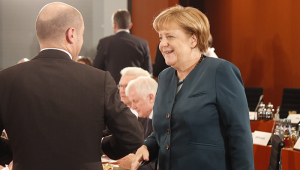web_berlin_shutterstock_288111119.jpg

Berlin, Germany.
The think-tank said this year Germany will see 1.8% growth, rather than the 1.5% previously forecast. In 2018 it predicts growth will hit 2%, rather than 1.8%.
“The German economy is strong and stable,” said Timo Wollmerhäuser, head of Ifo economic forecasting, referencing a phrase oft-repeated by members of the UK’s Conservative party during the recent election campaign as a means of describing prime minister Theresa May’s leadership.
“We are currently experiencing such a strong first half-year that the momentum will carry us into the coming year,” he continued.
As well as the high domestic demand in areas like construction and private consumption that has driven German growth in the past, Wollmerhäuser said there was a similar “dynamism” in manufacturing.
The recovery of the wider eurozone economy is also boosting exports.
According to the think-tank, the number of people in work will increase from 43.6 million in 2016 to 44.2 this year and 44.6 in 2018 – the highest level ever.
The number of unemployed people meanwhile will drop from 2.7 million last year to 2.5 million this year and 2.4 million in the year after, with the unemployment rate declining from 6.1% to 5.7% and 5.5% respectively.
Inflation, however, is also set to rise. The Ifo predicted it will jump from 0.6% to 1.7% this year and 1.6% in 2018.
With the general election due in September, the think-tank said extra costs are likely to eat in to Germany’s €26.4bn budget surplus, which will fall to €19.1bn this year before rising back to €22.9bn in 2018.
It is Germany’s current account, which measures the difference between the goods and capital flowing into and out of the country, however, which has been the subject of much international attention.
The country has a substantial surplus in this regard, putting it out of balance with the rest of the world. This has drawn criticism from figures like US president Donald Trump, and also prompted calls for Germany to spend more of its savings from institutions like the European Central Bank and International Monetary Fund.
According to the Ifo, this is set to rise further. Germany’s current account surplus, which stood at €261bn last year, will hit €265bn in 2017 and €279bn next year.












